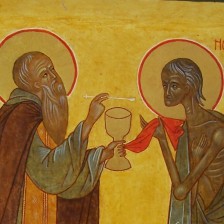Another characteristic of the passions is that in the man unquenchable thirst is manifested, which seeks to be quenched and can’t be. Blondel says that they represent man’s thirst for the infinite, turned in a direction in which they can’t find their satisfaction. Dostoevsky has a similar idea.
Neilos the ascetic writes that the stomach, by gluttony, becomes a sea impossible to fill – a good description of any passion. This always unsatisfied infinity is due both to the passion in itself, as well as to the object with which it seeks satisfaction. The objects which the passions look for can’t satisfy them because objects are finite and as such don’t correspond to the unlimited thirst of the passions. Or as St. Maximus puts it, the passionate person finds himself in a continuous preoccupation with nothing; he tries to appease his infinite thirst with the nothingness of his passions, and the objects which he is gobbling up become nothing, by their very nature. In fact, a passion by its very nature searches for objects, and it seeks them only because they can be completely under the control of the ego, and at its mercy. But objects by nature are finite, both as sources of satisfaction and in regard to duration; they pass easily into nonexistence, by consumption. Even when the passion also needs the human person in order to be satisfied, it likewise reduces him or her to an object, or sees and uses only the objective side; the unfathomable depths hidden in the subjective side escape him.

Leave a Reply